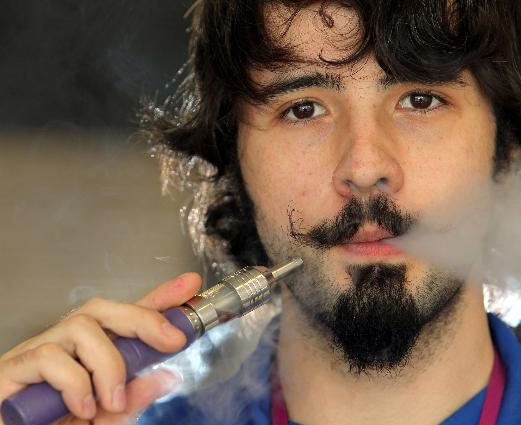E-cigarette regulation and taxes once again on the front burner at the Capitol
By WAYNE GREENE World Senior Writer
OKLAHOMA CITY – Three lawmakers are renewing the fight over an issue that lit up the state House last year – electronic cigarettes.
Last week, Speaker of the House T.W. Shannon approved so-called “e-cigarette” study proposals by Speaker Pro Tem Mike Jackson, Rep. Mike Turner and Rep. David Derby.
Jackson, R-Enid, is the second-ranking member of the House leadership. Derby, R-Owasso, is chairman of the House Public Health Committee and will oversee the studies.
An e-cigarette is an electronic inhaler that vaporizes a liquid nicotine solution, simulating the act of tobacco smoking. Like cigarettes, users get a nicotine fix. Unlike cigarettes, there is no smoke.
During the final days of the Legislature’s last session, the House rejected a bill backed by Jackson to deal with the same issue on a 66-29 vote after nearly three hours of questioning and debate.
At issue in the interim studies is how the devices are taxed and how their sales are regulated.
Derby’s study would investigate “regulation of vapor and other emerging nicotine products.”
The Jackson-Turner study would look into “taxation, tobacco harm reduction, and youth access to electronic cigarettes.”
Currently, state law doesn’t adequately address sales of e-cigarettes to minors, and “youth access is definitely something we need to address,” Jackson said.
The U.S. Food and Drug Administration is considering classifying the devices as tobacco products, a move that could result in a significant tax burden on people using them, he said.
If FDA action made the devices subject to the state’s tobacco tax, it could make the e-cigarette equivalent of a pack of cigarettes taxed at $8.50 to $9, Jackson said.
“What we don’t want to do is put a higher tax on a less-harmful product,” he said.
Jackson said his brother has used an e-cigarette to gradually reduce his nicotine dependency. He hasn’t used a cigarette in three or four months, Jackson said.
“I have seen first-hand how they can help,” he said.
The American Cancer Society opposed Jackson’s efforts last year and will continue to fight against efforts to reduce taxes on e-cigarettes, said James Gray, director of government relations for the Cancer Action Network.
There is no scientific evidence to back claims that e-cigarettes are an effective means of weening smokers from their habit.
No other state has taken the actions Jackson has proposed for Oklahoma, Gray said.
“I think this is a new direction of Big Tobacco, and (legislators are) really cautious about doing anything that provides a new market to Big Tobacco,” he said.
Doug Matheny of tobaccomoney.com said the claim that an FDA regulation could lead to a dramatic state tax hike is a “scare tactic.”
“It’s one of those classic examples of the tobacco industry – and I do believe the tobacco industry is behind this – to make legislators feel like they have to do something – they have to act,” Matheny said. “And actually they don’t need to at all in Oklahoma.”
A simple bill to restrict youth access to e-cigarettes should take less than one page, but the design here is about expanding markets for nicotine, not reducing smoking, Matheny said.
“These companies don’t really care what you buy from them as long as you continue to buy from them. They’re selling an addictive product that contains nicotine. As long as you don’t quit altogether, they’re happy.”
Tobacco lobbyists are a powerful force at the state Capitol, Matheny said.
According to Oklahoma Ethics Commission reports, contributions to Oklahoma state legislative campaigns from the Reynolds American Inc. political action committee increased by 70 percent in the 2012 election cycle. Meals purchased by lobbyists on behalf of Reynolds American Inc. increased by more than 50 percent, Matheny said.
http://www.tulsaworld.com/article.aspx/E_cigarette_regulation_and_taxes_once_again_on_the/20130716_11_A1_CUTLIN990334?subj=1



